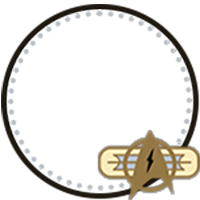They hit what the local shipmasters called the Pale Forks at impulse speeds, the caravan strung out behind the Farragut in a dishevelled fashion. Ahead, the map of the trade lane split around an old debris field, one branch heading to a local planetary system and the other carrying on deeper into the Shackleton Expanse.
“Contacts,” Kincaid said. “Thirteen ships, lying in wait in the shadow of the debris. There are three medium sized frigates, six converted freighters and four ships that would appear to be tugs with makeshift weapons and armour. Their profiles match the pirate conversions we’ve logged across the last week.”
“Pilgrims?” Parr asked, too even, because she already knew the answer.
“They’ve been waiting,” Ayres said, without a hint of surprise and just a little disappointment.
“Of course they have,” Parr murmured. “Jevlak, signal the convoy to move at pace away from the Farragut in the opposite direction. We’ll put out a screen. Red alert.”
The pirate flotilla slid out from behind the debris. Lights came up. Engines fired. A lead ship, one of the frigates, edged ahead and broadcast a hail at the Farragut.
“Starfleet,” the voice said, warm as a stove, “I am Captain Marat, speaking for the king. The king requests a discussion.”
Parr lifted her eyebrows at Ayres, who had not moved from his seat. He had a pilot’s ease in the chair, an unshowy alertness. “The king?” Ayres said. “Open channel,” Ayres said.
The main screen filled with a bridge that looked anything but: a cargo hold refitted as a hall, a scarred table in the middle, cheap banners hung along the walls, improvised computer terminals scattered in irregular patterns across the deck.
A Klingon sat at the far end, half in shadow. He was not masked. His face was lined with age and scars, with difficulty determining which was which. His long hair had gone silver. He wore a dark cloak draped over an old Klingon uniform, emblazoned with gold baubles and rusting badges.
“Captain Ayres,” he said, before introductions. “Welcome to my lane.”
“Your name?” Parr asked, polite as a scalpel.
He laughed heartily and then paused to consider the question. “To my enemies I have many,” he laughed again. “Here and now, to you, I am the king.”
“King,” Ayres said uncomfortably. “You called for a discussion. That’s a delicate word when you have a small fleet of armed ships arranged before us.”
“Delicate!,” the king roared, and added, because he understood the performance, “it has been many decades since I ‘discussed’ with Starfleet! But I remember your ways.”
“You have us at a disadvantage,” Ayres replied. “What do you want?”
“To be believed,” the king said, now low and serious. “To tell you a problem you will have soon enough without me, if you have not already met them.”
Parr leaned into the conversation. “The pilgrims?”
“Ah,” he said, pleased. “You’ve met the madness that plagues us all.”
“We’ve heard their songs and fought some of them off.” Parr said.
“We thought you were them.” Ayres added.
“Those crazed fools! They throw their lives away for no purpose!,” the Klingon’s eyes burned for a moment, then he became more measured again. “They are not our people.”
“No?” Ayres asked softly. “It appears that you share a hobby. A taste for other people’s cargo?”
“Wealth and glory, captain,” the king said without rancour. “We are thieves. We are organised. We enjoy a fight with honour. And, captain, we have built a life and a home out here long before you bothered to turn up.” He leaned forward, casting more of his wrinkled face into the light. “But we don’t skulk in the shadows like frightened children!”
“You’ve been attacked,” Ayres said.
The king lifted his shoulders and the heavy cloak moved like a leaden weight. “We’ve been courted,” he said. “We declined. They do not like competition. I do not like madmen.”
“Nor do we,” Ayres said.
“You like peace, Starfleet,” he said. “I’m here to make an offer for peace between you and I.” He turned his left hand over, palm up. “Where their pilgrim song thrives, my banners come down. Where I fly, they do not attack freighters. But those dogs have larger numbers.”
“What are you proposing, king?”
The Klingon stared into the viewscreen for a moment. “You need to understand. When we steal, we do not murder and mutilate those who cannot fight. We do not vent a deck full of crew into space and call it mercy. We take what we need and we leave enough that they can stand up, fight and swear at me next we meet. If we were to kill everyone, who would we fight?”
“Do you wish to fight us?” Ayres continued the soft tone, but with a hint of more edge.
“I am sure that your Starfleet sensibilities will find cause with us eventually,” he said pleasantly. “But I want to give you something. So that you may see that some of us who have been living out here – in the slow time – can find accord with you.” The king growled, throwing a data slate across the table. It skidded off the end and disappeared off the screen. “The pilgrims are not otherworldly gods. They have material needs. Someone pays for those needs.”
“And you wish to tell us whom?”
“I have the coordinates,” the king said, and the smile he wore now did not flatter him. “A station. They call it the Orantei. A place to dock. Repair slips. They’ve been refitting pilgrim ships out there for months. And charging the rest of us more to cover the dogs!”
Parr felt the shape of an argument and decided to leave it aside. “And you bring this to us because?”
“Because I like the lanes the way they were: dangerous, risky but negotiable. A game worth playing! They would replace my game with nothing. A void! Emptiness!”
A chime broke into the moment. Jevlak’s fingertips moved across her panel. “Captain,” she said. “I’m catching a secondary transmission, out at the edge of their formation. I believe we are being surveilled.”
“Captain,” Kincaid said, words clipped tight, “we have movement on the outer reaches of the debris field. There are more ships hiding.”
The king bristled at the news. “QI’yaH! Always with these dogs!” He hammered his fist on the table, sending more data slates crashing off the edge. “I will send you the coordinates. Until next time!”
The transmission cut and the hall vanished, replaced by a view of the debris field. The newcomers came in fast and straight.
“Scramble the squadron and keep the caravan as far from danger as possible,” Ayres said. “No one breaks out of line on their own.”
The Klingon’s formation did something that should have been clumsy, given the odd collection of ships, but shifted with an unexpected grace. The thirteen ships turned as if to look at one another and then quickly manoeuvred into a chevron. The larger ships took the points. The smaller ships assembled inward. Their engines burned low and blue; a ripple of impulse corrected the line until the angles were an impressive formation.
“They’re giving ground,” Jevlak said, puzzled.
“No,” Kincaid offered, watching their trajectory. “They’re preparing something.”
The first three Pilgrim craft knifed through the fringe of debris. Behind them, half a dozen more broke from their hiding places and surged.
“King’s ships are moving again,” Kincaid added, surprised into respect. “Are they laying a net?”
The Klingon’s ship’s shed canisters that looked, to a Starfleet eye, like junk. When released, each appeared to drift listlessly. Then their housings bloomed with a hard-edged pulse and every scrap formed part of a linked lattice.
“Those are mines of some kind.” Kincaid’s hand worked his console.
The faster ships of the Klingon pirate pounced. Their engines, clearly retrofitted and far more impressive than they appeared, sent them spiralling outwards, driving the Pilgrim’s ships toward the mines or forcing them to face a rapidly escalating barrage of additional magnetic mines, disrupter fire, and an eclectic assortment of kinetic weapons.
One of the larger and more capable Pilgrim ships hurtled up the centre and threw a spear of weapons fire at the King’s flagship before continuing its run, aiming to ram the ship. The Klingon’s ship appeared to shudder, then rolled exactly ninety degrees, letting the Pilgrim’s attack slide along the armour, bouncing back off into space. As the attacking ship cleared the Klingon, more space debris mines shot out from the ship and soared toward the Pilgrim, attaching themselves to the hull.
In a devastating ripple of bright flashes the mines detonated, the Pilgrim ship vanishing into fire.
“They certainly know how to fight.” Kincaid looked up toward the viewscreen. “It looks like the Pilgrim ships are trying to break away.”
The Klingon’s ugly fleet moved with extraordinary grace. Every time a Pilgrim ship looked to be on the verge of escape, another of the pirate’s ships cut them off, or drove them into a waiting collection of mines, the explosive debris increasingly indistinguishable from the real floating debris.
“Pilgrims are losing cohesion,” Kincaid said, his voice a blend of surprise and admiration. “The pirates are taking them apart with spectacular alacrity.”
“Now I’m glad that he doesn’t want to fight us.” Parr added, as astonished as the rest of the bridge.

 Bravo Fleet
Bravo Fleet








